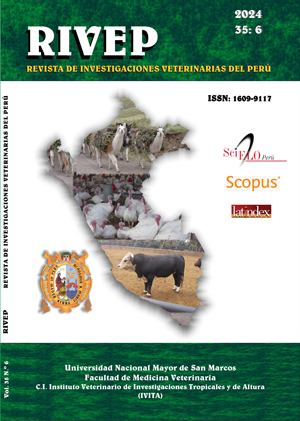Serological study of equine infectious anaemia in tourist equines from a municipality of Petén, Guatemala
DOI:
https://doi.org/10.15381/rivep.v35i6.27820Keywords:
equine infectious anemia, equids, Coggins testAbstract
The aim of this study was to determine the current serological status of Equine Infectious Anemia in the village of Carmelita, municipality of San Andrés, department of Petén, Guatemala. In total, 83 serum samples from equines (mules and horses) were analyzed through the Coggins test. Results showed that 19.3% of the animals were seropositive, with males representing 14% and females 5%. Likewise, 13% and 6% of equines and mules were seropositive, respectively. The presence of mechanical vectors such as horseflies, iatrogenic and vertical transmission, and the scarce sanitary controls can cause a prolongation of the disease cycle and represent a risk of infection to the tourist equine population of Carmelita.
Downloads
Downloads
Published
Issue
Section
License
Copyright (c) 2024 Sara Milián-Belloso, Manuel Lepe-López, Evelin Godoy

This work is licensed under a Creative Commons Attribution 4.0 International License.
AUTHORS RETAIN THEIR RIGHTS:
a. Authors retain their trade mark rights and patent, and also on any process or procedure described in the article.
b. Authors retain their right to share, copy, distribute, perform and publicly communicate their article (eg, to place their article in an institutional repository or publish it in a book), with an acknowledgment of its initial publication in the Revista de Investigaciones Veterinarias del Perú (RIVEP).
c. Authors retain theirs right to make a subsequent publication of their work, to use the article or any part thereof (eg a compilation of his papers, lecture notes, thesis, or a book), always indicating the source of publication (the originator of the work, journal, volume, number and date).



